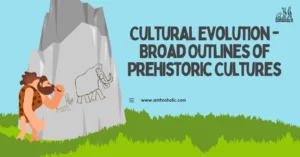AI Answer Evaluation Platform Live Now. Try Free Answer Evaluation Now
Cultural Anthropology
Cultural anthropology is a branch of anthropology that studies human cultures and societies, with a focus on the diversity and complexity of human social life. It examines how people make sense of their worlds, their social structures and institutions, their values, beliefs, and practices, and how they interact with one another and with the natural environment. Cultural anthropology is concerned with both contemporary and historical societies, and seeks to understand the cultural and social processes that shape people’s lives and experiences. It also aims to shed light on issues of power, inequality, and social justice, and to contribute to the development of cross-cultural understanding and respect.

Significance of Cultural Anthropology
Cultural anthropology is a significant discipline for its contributions to understanding human diversity and cross-cultural communication, informing public policy, and promoting social justice.
“Cultural anthropology is the science of the lived experience of human beings, in all its diversity and complexity, and therefore has the potential to contribute to the resolution of the most pressing social problems of our time”
David Harvey
One key contribution of cultural anthropology is its ability to promote cross-cultural understanding and communication. By studying the ways in which people from different cultures interact and communicate, anthropologists can identify commonalities and differences, and develop strategies for effective communication and collaboration (Kottak, 2013).
Additionally, cultural anthropology research can inform public policy and decision-making in areas such as healthcare, education, and social services. By understanding the cultural context of these issues, policymakers can develop more effective and culturally sensitive interventions (Nichter & Vuckovic, 1994).
Furthermore, cultural anthropology can help to challenge power and inequality by exposing the ways in which cultural beliefs and practices are used to reinforce social hierarchies and exclusion. By examining the social and cultural processes that shape people’s experiences of power and inequality, anthropologists can contribute to social justice movements and advocate for more equitable societies (Smith, 2010).
Distinction from related fields such as Sociology, Archaeology, and Linguistics
Cultural anthropology is distinct from related fields such as sociology, archaeology, and linguistics, although there is some overlap in their areas of study.
Sociology focuses on the study of human societies and social behavior, but tends to place more emphasis on the analysis of social structures and institutions, and less on cultural variation and diversity. In contrast, cultural anthropology places greater emphasis on cultural variation and diversity, and on the ways in which culture shapes people’s lives and experiences.
Archaeology, on the other hand, is concerned with the study of human societies and cultures in the past, based on the analysis of material remains such as artifacts and structures. While cultural anthropology also examines historical cultures and societies, it does so primarily through the study of contemporary cultures and societies, with an emphasis on understanding how they have developed and changed over time.
Linguistics is the study of language, and focuses on the structure, function, and evolution of languages, as well as the ways in which language shapes human thought and communication. While cultural anthropology also examines language, it does so within the broader context of culture, and explores the ways in which language is used to construct and communicate cultural meanings and values.
| Field | Focus | Methods | Time Period |
|---|---|---|---|
| Cultural Anthropology | Cultural variation and diversity, how culture shapes people’s lives and experiences | Participant observation, fieldwork, interviews, ethnography, data analysis | Contemporary cultures and societies, historical cultures and societies |
| Sociology | Social structures and institutions, social behavior | Surveys, statistical analysis, interviews, case studies | Contemporary societies |
| Archaeology | Material remains, human societies and cultures in the past | Excavation, analysis of artifacts and structures | Historical cultures and societies |
| Linguistics | Language structure, function, evolution, and influence | Analysis of language data, fieldwork | Historical and contemporary languages |
Goals of Cultural anthropology
The goals of cultural anthropology in the scientific study of culture are multifaceted. One of the primary goals is to describe and explain the diversity of human cultures and societies across time and space. By using a range of research methods such as participant observation, fieldwork, interviews, and data analysis, cultural anthropologists seek to gain a comprehensive understanding of the beliefs, values, practices, and social structures that shape people’s lives and experiences in different cultural contexts.
Another goal of cultural anthropology is to identify patterns and variations in cultural phenomena and to explain why these patterns and variations exist. This involves conducting cross-cultural comparisons, which help to reveal similarities and differences in cultural practices and beliefs across different societies. These comparisons can also help to identify factors that contribute to cultural change and continuity over time.
In addition, cultural anthropology seeks to understand the ways in which culture intersects with other social phenomena such as power, inequality, and identity. This involves exploring the ways in which cultural practices and beliefs shape social relations, and examining how social structures and institutions influence cultural expressive and variation.
The scientific study of culture
The scientific study of culture involves using systematic and empirical methods to understand the ways in which human beings create and sustain their cultural worlds. As cultural anthropologist James Clifford writes, “Culture is not an object or thing that we can see or touch, but a set of meanings, values, symbols, and practices that people use to make sense of their world and to communicate with others” (Clifford, 1988).
To study culture scientifically, cultural anthropologists use a range of research methods, including participant observation, fieldwork, interviews, surveys, and data analysis. These methods allow researchers to immerse themselves in the cultural world they are studying, to observe cultural practices and beliefs in context, and to collect data that can be used to generate new insights and understanding about cultural phenomena.
The scientific study of culture also involves a commitment to objectivity, transparency, and rigor in research methods and data analysis. Researchers aim to minimize bias and subjectivity in their work, and to clearly articulate their methods and findings in order to make their work replicable and transparent to others.
Understanding knowledge of human nature and cultural variety
Cultural variety affects how people interact with the world and interpret it, which has a basic effect on how people behave. Ruth Benedict, a pioneer in the field of cultural anthropology, once said that “culture provides the ultimate context for human behavior and shapes the way we understand and interpret our experiences” (Benedict, 1934).
In order to better comprehend cultural diversity and behavior, the field of study known as “cultural anthropology” conducts a thorough examination of human civilizations and social groupings. Cultural anthropologists try to fully comprehend how cultural ideas, values, and practices affect people’s lives and experiences by using a variety of study techniques, such as participant observation, fieldwork, interviews, and data analysis.
Cultural diversity is linked to more important social, political, and economic variables than it is to simply differing beliefs and behaviors, according to one of the main findings of cultural anthropology. According to Arjun Appadurai, an anthropologist with expertise in culture, “culture is not just an expression of identity but is also deeply implicated in issues of power, inequality, and global interconnectedness” (Appadurai, 1990).
Cultural Anthropology’s Impact on Political Change and Social Transformation
Due to its important insights into the relationships between socioeconomic inequality and cultural diversity, cultural anthropology has had a significant influence on public policy. Cultural anthropologists have been able to provide lawmakers with vital insights on how to create more effective and fair laws by employing rigorous research methodologies to investigate the subtle ways in which culture impacts people’s lives.
For instance, anthropologists have investigated how cultural practices and beliefs affect health outcomes, which has helped establish more culturally responsive healthcare policies and practices (Farmer et al., 2013). By exposing the ways in which cultural diversity interacts with larger social, political, and economic systems of power, cultural anthropologists have also made a significant contribution to the cause of social justice and the protection of the rights of underrepresented groups (Abu-Lughod, 1991).
By providing a more complex and nuanced understanding of the ways in which cultural practices and beliefs are influenced by historical, social, and political contexts, cultural anthropologists have also significantly contributed to eradicating widespread stereotypes and preconceptions about various cultures. This has aided in fostering tolerance, combating adverse opinions, and developing a stronger appreciation for cultural variety.
Cultural anthropology’s effects on people’s lives
Because it has made it easier to comprehend how culture affects people’s experiences and identities, cultural anthropology has had a significant positive impact on people’s lives. Cultural anthropologists have been able to shed light on the subtle ways in which cultural concepts, values, and practices affect the ways in which individuals view and interact with the world around them by examining the diverse range of human civilizations and groups.
Cultural relativism, which helps individuals comprehend and accept the variety of cultural behaviors and beliefs, is one significant contribution of cultural anthropology to people’s lives. Cultural anthropology has contributed to the advancement of greater tolerance and understanding of cultural variety by acknowledging that many cultures have their own distinctive viewpoints and interpretations of the world.
By providing a more nuanced and complicated knowledge of the ways in which cultural behaviors and beliefs are influenced by historical, social, and political contexts, cultural anthropology has also been crucial in eradicating negative stereotypes and prejudices regarding other cultures. As a result, damaging preconceptions and assumptions have been disproved, and cultural diversity is now better understood.
The study of cultural anthropology has enhanced social justice and human rights by identifying the negative effects that cultural practices and beliefs may have on minority groups. Cultural anthropology has helped to promote a better understanding of social injustice and inequality concerns and to strive for more fair and equitable laws and social structures by drawing attention to these challenges.
Methodologies used in Cultural Anthropology
Cultural anthropology employs a range of methodologies to study culture and society, including:
- Ethnography: Ethnography involves the study of a particular cultural group by living with them and participating in their daily activities. Ethnographers typically aim to provide a detailed and nuanced understanding of the cultural group being studied. Some classic examples of ethnographic studies include Clifford Geertz’s “The Interpretation of Cultures” and Bronislaw Malinowski’s “Argonauts of the Western Pacific.”
- Participant observation: Participant observation is a method of research in which the anthropologist observes and participates in the activities of the cultural group being studied. This method allows the researcher to gain a first-hand understanding of the cultural group and their practices. An example of participant observation in action is Margaret Mead’s study of adolescence in Samoa, as described in her book “Coming of Age in Samoa.”
- Interviews: Interviews involve structured or semi-structured conversations with members of the cultural group being studied in order to gain insights into their beliefs, values, and practices. Interviews may be conducted one-on-one or in group settings. An example of the use of interviews in cultural anthropology is Nancy Scheper-Hughes’ study of infant mortality in a Brazilian shantytown, as described in her book “Death Without Weeping.”
- Surveys: Surveys involve the collection of quantitative data through questionnaires or other standardized instruments. Surveys may be used to gather data on attitudes, beliefs, and behaviors of members of a cultural group. An example of the use of surveys in cultural anthropology is the World Values Survey, which aims to measure cultural values and attitudes across different societies.
Applications of Cultural Anthropology
Cultural anthropology has numerous applications in various fields. Here are some of the key applications of cultural anthropology:
- Education: Cultural anthropology is used in educational settings to teach students about cultural diversity and the ways in which cultures interact with one another. Anthropologists may also develop curriculum and teaching materials for courses in anthropology and related disciplines.
- Healthcare: Cultural anthropology is increasingly being used in healthcare settings to improve patient care by promoting cultural sensitivity and understanding. Anthropologists may work with healthcare providers to develop culturally appropriate care plans and interventions.
- Business: Cultural anthropology can help businesses navigate cultural differences and develop effective strategies for operating in different cultural contexts. Anthropologists may conduct research on consumer behavior, market trends, and other aspects of cultural relevance to business operations.
- International Development: Cultural anthropology is used in international development work to understand and address issues of poverty, inequality, and cultural difference. Anthropologists may work with development agencies to design and implement culturally appropriate programs and policies.
- Environmental Conservation: Cultural anthropology is used in environmental conservation efforts to understand the relationships between cultures and their natural environments. Anthropologists may work with conservation organizations to develop sustainable resource management practices and promote cultural awareness and appreciation for the natural world.
Cultural Anthropologists in the Workplace
Cultural anthropologists can provide valuable insights into workplace culture and help organizations navigate cultural differences. They may be employed in a variety of settings, including business, healthcare, and government. For example, in the healthcare industry, cultural anthropologists can help to address cultural barriers to healthcare access and delivery. (Feldman-Savelsberg et al., 2015)
The Impact of Cultural Anthropology on Society and the World
Cultural anthropology can have a significant impact on society by providing insights into cultural diversity and promoting cross-cultural understanding. Cultural anthropologists can contribute to public policy, social change, and international development efforts. For example, anthropologists have been involved in efforts to promote sustainable development and protect the rights of indigenous peoples. (Hastrup & Olwig, 2018)
The Role of Cultural Anthropology in Addressing Social Problems
Cultural anthropology can play an important role in addressing social problems by providing a critical perspective on cultural practices and power relations. Cultural anthropologists may be involved in advocacy, activism, and community organizing, as well as research and analysis. For example, anthropologists have been involved in efforts to address issues such as poverty, inequality, and environmental degradation. (Kleinman et al., 2010)
Cultural Anthropologists in Education and Research
Cultural anthropology plays a central role in education and research, both within the discipline and in interdisciplinary collaborations. Anthropologists may conduct research on a wide range of topics, from the study of language and communication to the analysis of political and economic systems. They may also be involved in teaching and training future anthropologists, as well as collaborating with scholars in other fields. (Kottak, 2020)
Key Concepts in Cultural Anthropology
Cultural anthropology is a broad and complex field, but there are several key concepts that are essential to understanding its scope and focus. Here are some of the most important concepts in cultural anthropology:
- Culture: Culture refers to the shared beliefs, values, practices, and behaviors of a group of people. It is learned and transmitted from one generation to the next, and is constantly evolving and changing.
- Ethnocentrism: Ethnocentrism is the tendency to view one’s own culture as superior to others. It can lead to prejudice and intolerance of other cultures.
- Cultural relativism: Cultural relativism is the idea that cultures should be understood and judged on their own terms, rather than based on the standards of another culture.
- Enculturation: Enculturation refers to the process by which individuals learn and internalize the norms and values of their culture.
- Fieldwork: Fieldwork is the primary research method used in cultural anthropology. It involves living among and observing a group of people in their natural setting in order to understand their culture and way of life.
- Participant observation: Participant observation is a specific type of fieldwork in which the researcher actively participates in the culture being studied while also observing and recording data.
- Cultural evolution: Cultural evolution refers to the process of cultural change over time. It can be driven by a variety of factors, including technological advancements, environmental pressures, and contact with other cultures.
- Kinship: Kinship refers to the social relationships that exist between individuals based on their family ties and other forms of relatedness.
- Gender: Gender refers to the socially constructed roles, behaviors, and expectations associated with being male or female.
- Power: Power refers to the ability of individuals or groups to exert influence over others. It can be based on a variety of factors, including wealth, status, and knowledge.
These key concepts provide a foundation for understanding the complexity and diversity of cultures around the world, and the ways in which cultural anthropology seeks to explore and explain them.
Theoretical Perspectives in Cultural Anthropology
Cultural anthropology is a broad field that encompasses the study of various aspects of human cultures, including their beliefs, practices, and institutions. To make sense of this vast and complex subject matter, cultural anthropologists have developed a range of theoretical perspectives and frameworks that help to guide their research and analysis. These theoretical perspectives provide different ways of understanding cultural phenomena, and they often shape the questions that anthropologists ask, the methods they use to gather data, and the interpretations they make of their findings. Understanding these theoretical perspectives is essential to gaining a deeper appreciation of the complexities of human culture and behavior.
For those considering a career or further study in cultural anthropology, the diverse theoretical perspectives and methodologies used in this field offer a rich and rewarding intellectual journey. By studying cultural anthropology, you will develop a deep understanding of human diversity and the ways in which cultures shape our experiences and behaviors. Moreover, the skills and knowledge you will gain through studying cultural anthropology, such as cross-cultural communication, critical thinking, and research methodology, are highly valued in a wide range of careers and professions. Whether you aspire to work in academia, public policy, international development, or any number of other fields, cultural anthropology provides a solid foundation for a rewarding and impactful career. So, if you are passionate about understanding human cultures and are excited about the prospect of making a difference in the world, then cultural anthropology may be the field for you.
People also Ask
References
- Abu-Lughod, L. (1991). Writing against culture. Lila Abu-Lughod, 6-23.
- Appadurai, A. (1990). Disjuncture and difference in the global cultural economy. Theory, culture & society, 7(2-3), 295-310.
- Benedict, R. (1934). Patterns of culture. Houghton Mifflin.
- Clifford, J. (1988). The predicament of culture: Twentieth-century ethnography, literature, and art. Harvard University Press.
- Farmer, P., Kleinman, A., & Kim, J. Y. (2013). Reimagining global health: An introduction. University of California Press.
- Geertz, C. (1973). The interpretation of cultures. Basic Books.
- Harvey, D. (2018). The importance of cultural anthropology. Anthropology News, 59(4), e147-e148. https://doi: 10.1111/AN.832
- Kottak, C. P. (2013). Mirror for humanity: A concise introduction to cultural anthropology. New York: McGraw-Hill.
- Malinowski, B. (1922). Argonauts of the Western Pacific. Routledge.
- Mead, M. (1928). Coming of age in Samoa. William Morrow & Company.
- Nichter, M., & Vuckovic, N. (1994). Anthropology and international health: Asian case studies. International Journal of Epidemiology, 23(2), 293-299. doi: 10.1093/ije/23.2.293
- Smith, L. T. (2010). Decolonizing methodologies: Research and indigenous peoples. London: Zed Books.




